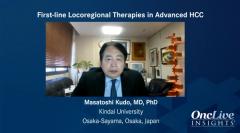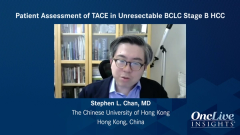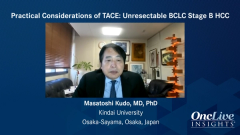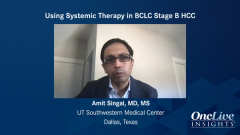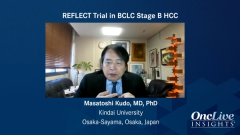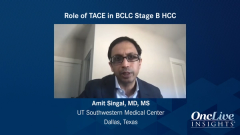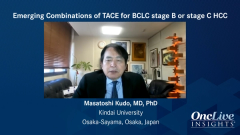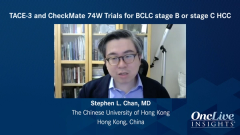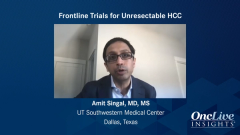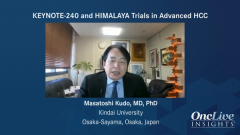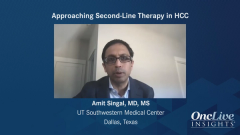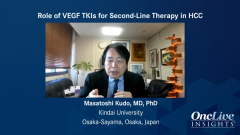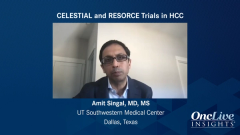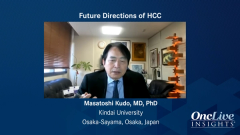
Sequencing With Anti-PD-1 Antibodies in HCC
Amit Singal, MD; Masatoshi Kudo, MD, PhD; and Stephen L. Chan, MD, share their personal approaches to sequencing with an anti-PD-1 antibody after first-line atezolizumab-bevacizumab in HCC (hepatocellular carcinoma).
Episodes in this series

Stephen L. Chan, MD: Nowadays, 1 of the hot topics is about what will be the optimal second- or third-line agents after the patient had been treated with the new standard of the atezolizumab-bevacizumab in the first-line setting. The question is if the past can be answered by another randomized phase 3 study comparing different systemic therapy after the failure of atezolizumab and bevacizumab. We know that it will not be very easy because most of the drugs have been approved. It’s difficult to conduct a phase 3 study again. But we can use several approaches. One is to use the unused TKI [tyrosine kinase inhibitor] because the TKI sequence has been shown to prolong overall survival, and it’s reasonable to believe that this sequence of the TKI will also benefit those patients who have failed or become intolerant to the first-line atezolizumab-bevacizumab.
In fact, recently at ASCO GI [American Society of Clinical Oncology Gastrointestinal Cancers Symposium] and also in our group, there have been a number of real-world experience reports showing that the use of the TKI after the failure with atezolizumab-bevacizumab could lead to a reasonable survival and modest response rate in a group of patients. Another point we can consider is based on the local reimbursement criteria. For example, the sorafenib, the lenvatinib, the cabozantinib, or even the regorafenib—all these drugs can be the choices and depend on the local reimbursement criteria.
These drugs will be 1 of the choices for the use after the failure with the first-line atezolizumab-bevacizumab. In our experience, we move the old, first line to the new second-line agents. For example, sorafenib or lenvatinib will be the reasonable choices because most of our oncologists or hepatologists have experience with this TKI. This drug is quite well tolerated even after with failure with the first-line agents.
Another point I would like to mention is that nowadays giving the high response rate with the first-line immuno-combinations, some patients can have a down staging of the cancers. They may have response, for example, in the extrahepatic metastasis with some oligoprogression in the intrahepatic diseases. For these patients, apart from giving another second-line systemic therapy, we may also put the patient on the locoregional therapy, for example TACE [transarterial chemoembolization] or even radiotherapy. All these could also potentially help a select number of patients by shrinking the tumor inside the liver. Now the second- or third-line treatment options will be more flexible. There will be many more options for our patients, and this will contribute to the improvement in the overall survival of the patients.
Masatoshi Kudo, MD, PhD: As far as efficacy, an early phase 1b study showed that lenvatinib-pembrolizumab is better than atezolizumab-bevacizumab. As a second-line therapy, lenvatinib-pembrolizumab is a choice and will be effective, even if there is failure after atezolizumab-bevacizumab. In nivolumab-pembrolizumab, the mode of action is different, so it can be effective after failure of atezolizumab-bevacizumab. Of course, efficacy is better in lenvatinib-pembrolizumab and the nivolumab-pembrolizumab, but toxicity is a little higher compared with atezolizumab-bevacizumab. But we can manage the adverse event, so it’s a promising second-line agent.
Amit Singal, MD, MS: KEYNOTE-240 was the phase 3 study that looked at pembrolizumab vs placebo in the second-line setting. KEYNOTE-240 is an interesting lesson in trial design and statistical analyses because when we look at the results from the KEYNOTE-240, we see notable improvements in overall survival as well as progression-free survival, although neither hit the prespecified alpha. Neither was considered statistically significant when you considered early looks at the data as well as having 2 coprimary end points. Even though we saw notable improvements in overall survival, the trial was considered a negative trial in the second-line setting.
At ASCO GI, we had a chance to see updated survival estimates from the KEYNOTE-240 study. When you look at this, you see the curves do continue to remain separated, and the survival with pembrolizumab continues to be numerically higher than that observed with placebo, with a P value that continues to be less than .02. However, it doesn’t change the overall interpretation of the study, where when you take a look at this. Unfortunately it continues to fail to meet the prespecified end point of the trial and, therefore, still has to be considered a negative trial despite these improved survival estimates that we see with continued follow-up over a longer period of time.
Transcript Edited for Clarity


